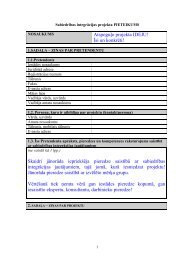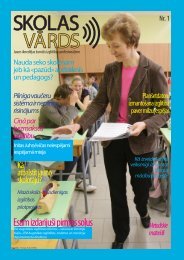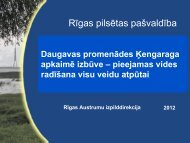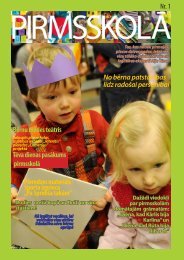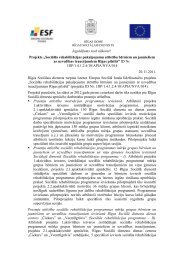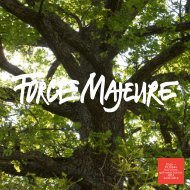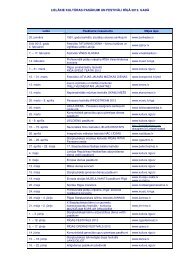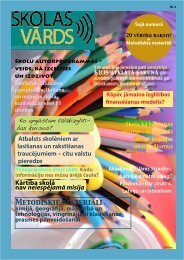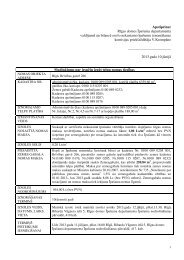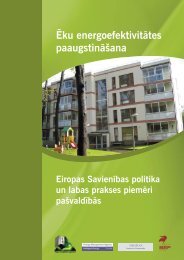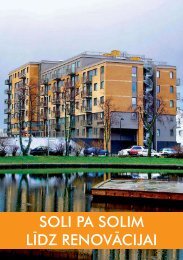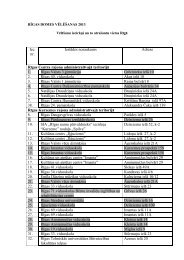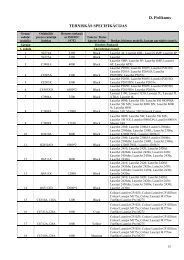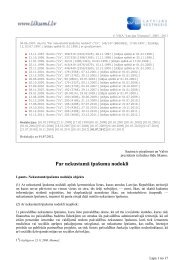Riga - European Capital of Culture 2014 candidate
Riga - European Capital of Culture 2014 candidate
Riga - European Capital of Culture 2014 candidate
- No tags were found...
You also want an ePaper? Increase the reach of your titles
YUMPU automatically turns print PDFs into web optimized ePapers that Google loves.
noisy neighboursClashes <strong>of</strong> power, conflict zones arean inescapable part <strong>of</strong> the reality <strong>of</strong>the contemporary world. Rebellion andconflict are the norm, unavoidable, regardless<strong>of</strong> which part <strong>of</strong> the world weare in. The presence <strong>of</strong> direct or indirectconflicts and collisions leaves anindelible mark on the consciousnessand actions <strong>of</strong> people.museum <strong>of</strong> legaciesLegacies are the things to which storiesbelong, for which people createlegends. Legacies are the things,which help people to orientate themselvesin the world. Wars, fires, changesin values destroy legacies, but it isnot within the power <strong>of</strong> any invincibleforce to destroy everything. There arelegacies that are more powerful thanany force, which, because <strong>of</strong> theirstories, help us survive, making thestory about oneself, the city, countryand the world even bigger. Everyoneinherits legacies from generation togeneration, to which he allocates hisFor the <strong>2014</strong> “Poetry Days” the intention isto invite participants from the world’s conflictzones. Conflict zones will mean notjust countries where there are real conflictsor real war activity zones, but also countrieswhere intolerance towards culture, ahigh level <strong>of</strong> prejudice and cultural conflictcan be observed, for example Turkey andGreece, England and France, the Balkancountries, Spain and Catalonia, Georgia,Russia and the USA. The short-term goalon which the choice <strong>of</strong> guests will bebased is to prove that culture can overcomevarious conflicts and is above andbeyond the rifts between different nations,even war activity. The long-term goal <strong>of</strong> theproject is to promote cross-border activities,break stereotypes and initiate a closerlook at the different cultures <strong>of</strong> the world.The “Noisy Neighbours” programme intendsto include guest poet public readings,as well as a master class combinedwith a seminar, where all interested partieswith or without prior experience in literaryactivities will be able to participate andgain skills, advice and inspiration frompr<strong>of</strong>essionals from other countries. Openown story and which have influencedthe life <strong>of</strong> his family, his personal life.Legacies make it possible to restoretime.Several centuries ago every country dwellerwho crossed <strong>Riga</strong>’s border had to bringwith him two cobblestones, from which<strong>Riga</strong>’s streets were made. Everyone arrivingat the <strong>European</strong> <strong>Capital</strong> <strong>of</strong> <strong>Culture</strong> willbe asked to submit to the exhibition personalitems with a historic legacy. The location<strong>of</strong> the exhibition is planned in one <strong>of</strong>the former Freedom Street factories – VEFor in the territory <strong>of</strong> <strong>Riga</strong> Wagon Factory.Together with this large-scale project,which will run for the entire ECC year, anexhibition is planned in the Museum <strong>of</strong> thelectures are also planned at the University<strong>of</strong> Latvia and Latvian Academy <strong>of</strong> <strong>Culture</strong>,during which students and other interestedparties will have the opportunity to meetforeign poets, find out about current eventswithin their cultures, develop discussionsand exchange information.What: Poetry readings in an urbanenvironment, masterclass, seminars.Where: Esplanade, Academy <strong>of</strong> <strong>Culture</strong>,University <strong>of</strong> Latvia.When: September.Concept authors: Inga Bodnarjuka, IevaKolmane, Uldis Bērziņš.Organisers: Latvian Writers’ Union.Cooperation partners: Latvian Literature.Centre, Ventspils International Writers’and Translators’ House.History <strong>of</strong> <strong>Riga</strong> and Navigation “Stories <strong>of</strong>100 objects from the museum collectionabout Europe”. The exhibition would display100 legacies from the museum collection,which have an outstanding historicor artistic value, or value linked with theidentity <strong>of</strong> <strong>Riga</strong> inhabitants.What: Exhibition.WHERE: VEF or <strong>Riga</strong> Wagon Factoryterritory.When: January.Concept authors: Inese Zandere, Museum<strong>of</strong> the History <strong>of</strong> <strong>Riga</strong> and Navigation.Organisers: Museum <strong>of</strong> the History <strong>of</strong> <strong>Riga</strong>and Navigation, Occupation Museum,War Museum, LU Faculty <strong>of</strong> History andPhilosophy.ruptureWar is the biggest <strong>of</strong> barbarisms, thesupreme sin, war is a man’s world, waris something which cannot be framed.War is the object <strong>of</strong> 20th century artisticreflection, which is inextricablylinked with Europe’s historic traumaand collective experience. War is therupture <strong>of</strong> the evolution <strong>of</strong> mankind or,maybe evolution is the rupture <strong>of</strong> theprogress <strong>of</strong> war?The Latvian National Art Museum ExhibtionHall Arsenāls, which was historically builtand used as a military depository in the19 th /20 th centuries, in <strong>2014</strong> will become thelocation for a large-scale exhibition, whichwill mark out artists’ views and positionstheatrical collisionboulevardFreedom Street is the location <strong>of</strong> thestage for collisions <strong>of</strong> war. During the1 st World War monuments and factorieswere evacuated from here, whichnever returned to their places after theend <strong>of</strong> the war. <strong>Culture</strong> has always reactedto political and historic events,creating a kind <strong>of</strong> space for tension inthe forms <strong>of</strong> drama and theatre.In <strong>2014</strong> the Daile theatre on FreedomStreet and untraditional premises for thetheatre environment – 1 st World War evacuatedfactory territories, will become thelocations for <strong>European</strong> theatre guest performances.Over the course <strong>of</strong> the year theguest performance programme will <strong>of</strong>fersix <strong>of</strong> the world’s most prominent artiststheatre performances, relating to collision,male-female and conflict solutions, and theprewar-postwar theme. The programmeregarding the war theme. The exhibition willprovide an insight <strong>of</strong> the museum collection– Grosvalds, Kazāks and others,Anselm Keefer, Shirin Neschat, NedkoSalakov –, and will <strong>of</strong>fer contemporaryartist interpretations (Imants Lancmanis,Sandra Krastiņa, Ilmārs Blumbergs, KatrīnaNeiburga, Krišs Salmanis, Miķelis Fišers),as well as present the works <strong>of</strong> internationallyrecognised foreign artists.The intention is to supplement the exhibitionwith historical materials (photographs,interior elements, weapons, etc) from thecollections <strong>of</strong> the Latvian History Museum,Latvian War Museum and Museum <strong>of</strong> theHistory <strong>of</strong> <strong>Riga</strong> and Navigation, whichwould allow for a more detailed characterisation<strong>of</strong> the period and appeal to a broaderrange <strong>of</strong> society. The planned exhibitionwill be selected by the curators <strong>of</strong> theLatvian New Theatre Institute, putting theaccent on the contemporary tendenciesand quality <strong>of</strong> guest performances andtheir place within the context <strong>of</strong> <strong>European</strong>theatre art and at the same time encompassingthe needs <strong>of</strong> various groups <strong>of</strong> society.In <strong>2014</strong> the intention is to invite artistssuch as Christoph Marthaler (Switzerland),Alain Platel (Belgium) and Krzyszt<strong>of</strong>Warlikowski (Poland) to bring guestperformances to <strong>Riga</strong>. Parallel to eachguest performance the LNTI will developeducational programmes, film sessionsand lectures, during which talks and discussionswill take place regarding theatreart in a wider discourse. Geographically,the guest performances will encompassthe Freedom Street trajectory <strong>of</strong> <strong>Riga</strong> territory.The implementation <strong>of</strong> this type <strong>of</strong>programme will confirm that <strong>Riga</strong> is theplace for regular, high-quality projects inthe field <strong>of</strong> contemporary theatre.will propose an original view through theprism <strong>of</strong> the theme <strong>of</strong> war, which will markout the collision <strong>of</strong> forces, position theevents <strong>of</strong> war as the catalyst <strong>of</strong> an era or,on the contary, as an irreparable rupture <strong>of</strong>the regular course <strong>of</strong> history, illustrate thedifferences in the interpretations <strong>of</strong> eventsby men and women, as well as reveal anddemonstrate many other viewpoints, fromwhich it is possible to look at significantevents in our history.What: International exhibition.Where: Exhibition Hall Arsenāls.When: All year.Concept authors and organisers: LatvianNational Art Musuem in cooperation withthe Contemporary Art Centre.What: Theatre guest performanceprogramme.Where: Daile theatre, VEF (StateElectrotechnical Factory), <strong>Riga</strong> CinemaStudio, <strong>Riga</strong> Wagon Factory territory.When: Begins in February.Concept authors and organisers: LatvianNew Theatre Institute.Cooperation partner: Daile theatre.54 55



